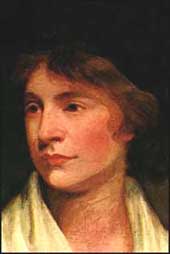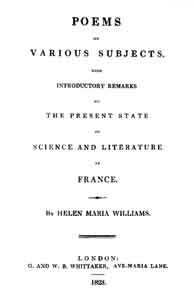| Dear Mrs. W, |
| I have heard about the many good things you have done for those poor souls in the West Indies! I would love to help out, but I feel that I do not know enough about what you actually do. Could you tell me a little about what sorts of activities you organize, and if you have any suggestions as to how I can raise awareness here, it would be greatly appreciated! |
|
Sincerely
yours,
|
|
S.
Ash
|
 |
|
Mary Wollstonecraft, Britain's leading female
abolitionist. (43)
|
| Dear Ms. Ash, |
| Thank you for your interest not only in the predicament of the slaves, but of women as well. Indeed, it is time for British women to take a stand against this blot on British civilization. After all, are we not women and sisters (41) to the slaves in the West Indies? |
| We are particularly interested in the plight of female slaves. Black women in the West Indies are doubly wronged: they are both plantation and sexual slaves (42). Not only are women forced to work in the fields, but they must submit to their masters' desires. I have received a letter from an acquaintance in Barbados telling me about the tension between masters and their female slaves: our sisters are suffering! |
| Despite the slaves' efforts in the West Indies, we must act here if we are ever to see justice in the Empire. Here,in Bristol, we have organized a massive boycott of slave-produced products, most notably sugar (more information on sugar is available here). Further, we, along with the local Quaker congregation, have organized several petitions to Parliament (44) asking for not only the curtailment of the trade, but the abolition of the institution altogether. I believe that these efforts we have made can be duplicated anywhere- please keep me informed as to your progress. |
|
Yours,
|
|
Mrs.
W.
|
| Dear Mrs. W, |
| Thank you for your suggestions. I have been successful in organizing a local boycott, and the local shopkeepers are already expressing dismay! Because of this experience, I feel that us women have gained a public voice in an arena otherwise closed off to our sex. I wish you the utmost luck in your efforts aimed at Parliament, and I have no doubt that you will eventually succeed. We will continue to look to you for guidance! |
|
Most
respectfully,
|
|
S.
Ash
|
 |
|
A title page from a collection of Helen Williams'
poems (47)
|
| Dear Ms. Ash, |
|
You are quite correct- the struggle for slaves is also the struggle for our own rights. "It is the British woman's duty to plead for those of our own sex, who have less to plead for than ourselves, who cannot speak their misery and shame" (45). We might not have many political rights, but ours are infinitely more than any slaves'. This is the perfect opportunity to expand our own rights while preserving those of our fellow man. |
|
Already, we are gaining a voice. Both Mary Wollstonecraft (More on Wollstonecraft is available at the ECE site, "Mary Wollstonecraft: The Politcal as Personal") and Helen Williams have published several articles and books (46) on the subject. And, we are not only being published in the political realm, but female novelists, such as Frances Burney, are entering the male-dominated market. Congratulations on your success. Best of luck in continuing success! |
|
Yours,
|
|
Mrs.
W.
|